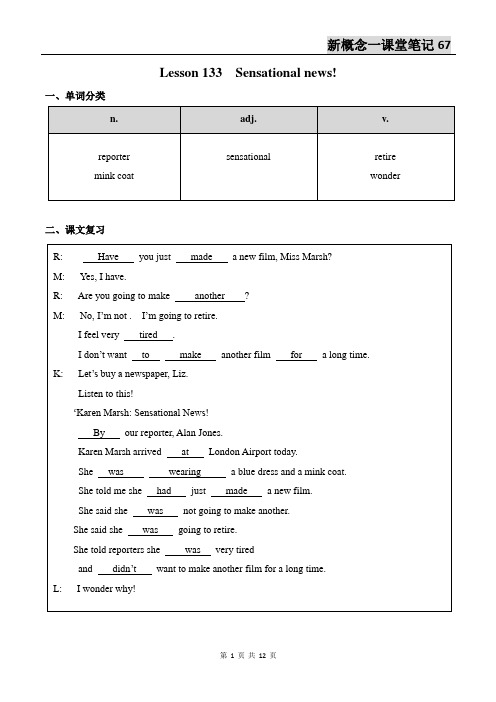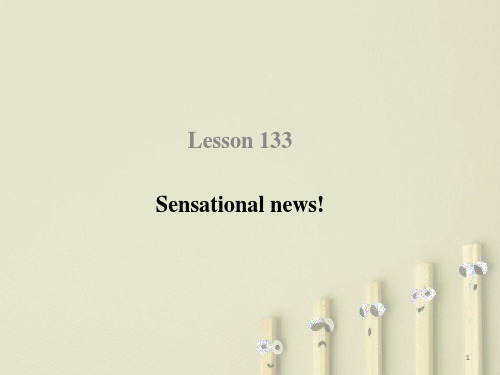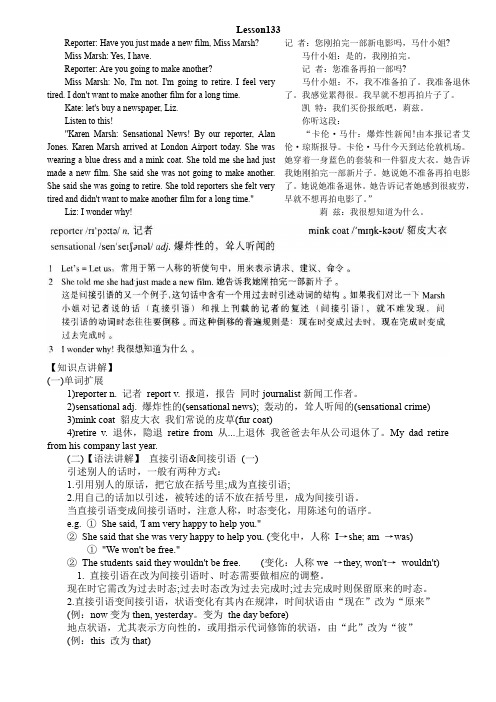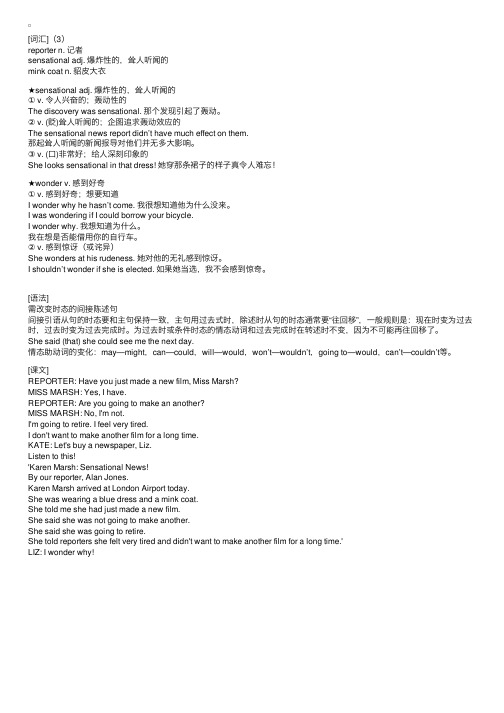新概念一册133
新概念第一册(1)133-134课

D B
B
.
Thank you!
.
They. said that
III.将下列句子变成“一般疑问句“(注意时态) 1. She is sleeping at home. 2. He can ride a bike. 3. Paul likes swimming. 4. She often does her housework in the morning. 5. I played basketball yesterday. 6. It is going to rain this afternoon. 7. Lucy was at school last Monday. 8. He watched TV last night.
3. Mink coat /miŋk/ [miŋk] 貂皮大衣
.
★wonder = want to know 后面常跟由特殊疑问词(why/ what/who/where/when/how等) 组成的句子
I wonder why. I wonder who Yang mi is.
★arrive in(大地方)/ arrive at(小地方)
★当动词所表示的状态或或动作在引述时仍在继续时 : “I’m forty,” heisaid. →He said he ___ forty. 他说他40了。
★当引述的是客观事实,科学真理及格言等: He said, “the sky is blue.” →He said the sky __i_s_ blue.
II.将下列句子变成间接引语 1. Tom said,“I’m watching TV.”
Tom said that 2. He said,“I’ve lost my bike.”
新概念英语第1册Lesson133~140课文详注

【导语】新概念英语⽂章短⼩精悍,语句幽默诙谐,语法全⾯系统。
适合各个阶层的⼈群学习参考。
相信有了新概念英语,你也可以成为“⼤神”级别的⼈物!还在等什么?快来加⼊学习吧!⼩编与您⼀起学习进步!新概念英语第1册Lesson133~134课⽂详注 1.Have you just made a new film, Miss Marsh? 您刚拍完⼀部电影吗,马什⼩姐? make 可表⽰“作出某种举动”,其意义根据宾语⽽定。
本句中的make可理解为“拍(摄)”。
2.make another,再拍⼀部。
之后省略了film。
3.by our reporter = written by our reporter。
新概念英语第1册Lesson135~136课⽂详注 1.He won't let me make another film.他不会再让我拍电影了。
句中动词let后⾯的不定式不带to,类似的例⼦如动词have,make等。
2.introduce A to B,将A介绍给B,向B介绍A。
3.get married,结婚。
4.the latest,最新消息。
5.…she would have to ask her future husband. …她得问问她的未婚夫。
这部分是从句,在整句话中作said的直接宾语。
would have to ask是过去将来时结构。
因为主句的谓语动词是said,相对过去的这⼀时间点的将来就是过去的将来,所以⽤过去将来时结构。
新概念英语第1册Lesson137~138课⽂详注 1.do the football pools,下⾜球赛的赌注。
football pools 是英国流⾏的⼀种赌博⽅式,靠在⾜球⽐赛结果上的赌注来决定输赢。
2.What will you do if you win a lot of money?如果你赢了许多钱,你打算做什么呢? if you win a lot of money是⼀个表⽰条件的状语从句。
新概念英语第一册Lesson 133-134

Lesson 133-1341. I feel very tired. 感官动词+adj,5大感官动词:look, smell, feel, sound, taste + adj. She looks thoughtful.她看起来若有所思。
The flower smells sweet.花闻起来真香。
The silk feels soft.这个丝绸摸起来真柔软。
The music sounds sweet.这音乐听起来真悦耳。
The soup tastes delicious. 汤真好喝。
2. arrive in(大地方)/arrive at(小地方)3. I wonder why= I wonder why she is not going to make another film.wonder = want to know 想知道;表示疑虑wonder 后可以跟why/what/who/where/when/how 等特殊疑问词引导的宾语从句语法1.间接引语的概念由本人说出的话带引号的为直接引语,而由自己或别人转述的话,为间接引语eg He says, ‘He is going to leave.’ He says that he is going to leave.2. 直接引语变间接引语和间接引语变直接引语He want to go to England next week. They will go to America next year.They say —He says —3.间接引语与直接引语的过去式转换方式如果在直接引语说话时是过去时(They said / I said / He said )后面的时态则需要变为相应的过去时态(即在引语中原有的时态上加一个过去)时态变化注意:一般将来时改成过去将来时(一般用would +动词原形):‘I'll have to ask my husband,’she said.She said (that) she would have to ask her husband.她说她将得去问问她丈夫。
新概念英语第一册第133-134课-Sensational-news

新概念英语第一册第133-134课:Sensational news Lesson 133 Sensational news!爆炸性新闻!Listen to the tape then answer this question.What reason did Karen Marsh give for wanting to retire?听录音,然后回答下列问题。
卡伦.马什说她为什么想要退休?Reporter: Have you just made a new film, Miss Marsh?记者:您刚拍完一部新电影吗,马什小姐?Miss Marsh: Yes, I have.马什小姐:是的,我刚拍完。
Reporter: Are you going to make another?记者:您预备再拍一部吗?Miss Marsh: No, Im not. Im going to retire. I feel very tired.我预备退休了。
我感觉累得很。
I dont want to make another film for a long time.我早就不想再拍片子了。
Kate: lets buy a newspaper, Millie.凯特:我们买份报纸吧。
莉兹。
Listen to this!你听这段:“ Karen Marsh: Sensational News! By our reporter,Alan Jones.“卡伦.马什:爆炸性新闻!由本报记者艾伦.琼斯报导。
Miss Karen Marsh arrived at London Airport today. She was wearing a blue dress and a mink coat.卡伦.马什今日到达伦敦机场。
她穿着一身蓝色的套装和一件貂皮外套。
She told me she had just made a new film. She said she was not going to make another.她告知我她刚拍完一部新片子。
2020最新新概念英语第一册Lesson133~138语法及单词解析

新概念英语第一册Lesson133~134语法及单词解析语法 Grammar in use需改变时态的间接陈述句间接引语里常要改变时态,这是因为原来讲的话与转述这些话之间有一段间隔。
选择哪种恰当的形式取决于转述者的着眼点。
在间接引语里通常并不确切地重复讲话者说过的话。
转述通常发生在过去,所以引述动词通常是过去时。
因此,转述时从句的时态通常要“往回移”(back shift)。
一条普遍的规则是:现在时变为过去时,过去时变为过去完成时。
为过去时的情态助动词和过去完成时在转述时不变,因为不可能再往回移了。
使用间接引语主要是为了简洁、紧凑地把说话内容转述给第3者。
请看下面直接引语变成间接引语时在时态等方面必须作出的相应变化:(1)一般现在时改为一般过去时:‘I'm thirsty,’she said.“我渴了”她说。
She said (that) she was thirsty.她说她渴了。
(2)现在进行时改为过去进行时:‘I'm having a rest,’ she told them.“我正在休息”她告诉他们。
She told them (that) she was having a rest.她告诉他们说她当时正在休息。
(3)现在完成时改成过去完成时:‘I've just made a new film,’ she told me.“我刚完成一部新电影”她告诉我。
She told me(that) she had just made a new film.她告诉我说她刚完成一部新影片。
(4)一般将来时改成过去将来时(一般用would +动词原形):‘I'll have to ask my husband,’she said.“我得问问我丈夫”她说。
She said (that) she would have to ask her husband. 她说她将得去问问她丈夫。
新概念英语第一册Lesson133-134笔记(语法点+配套练习+答案)

Don’t speak aloud. Hehasjustslept(sleep).
Imet(meet) an old friend in the street just now.
I feel very tired.我感觉很累。
feel,系动词,后跟形容词
Turn on the air-conditionerimmediately .
我们庆祝爷爷退休。
reporter n.记着
report v.报道
It is reported that ...据报道
John is anews reporter.John是个新闻记者。
It isreported(reported, reporting)that the thief was caught two hours ago.
Lesson 133 Sensational news!
1、单词分类
n.
adj.
v.
reporter
mink coat
sensational
retire
wonder
2、课文复习
3、课文重点
重点
练习
retire v.退休
retire from ...从...退休
n.retirement来自构词法:v.+ ment = n.
听,这是什么声音?你能听到吗?
Yousoundterrible. Do you have a sore throat?
by sb.被,由
a book writtenbyBacon培根写的一本书
The boywas hitbya ball.男孩被球打。
The news is reportedbyhim.新闻被他报道。
新概念英语一133课

the next (following) day 第二天
there 那天
She said, “I’ll go to Beijing tomorrow.” She said that she would go to Beijing the next day.
He said, “My sister was here.”
Lesson 133 Sensational neer • sensational • mink coat
n. 记者 adj. 爆炸性的,耸人听闻的 n. 貂皮大衣
2
reporter n.
-er 后缀,表示人
-or, -ess(女) , -ee,
learner 学习者 doctor 医生 actress 女演员
want to make another film
12
• I wonder why! • wonder “不知道,想知道”,表示疑惑 • 我不明白谁会这样干 • I wonder who could do this. • 我想知道他是否能成功 • I wonder if he will succeed.
5
• Have you just made a new film? Yes, I have. • make a film 制作一部影片,拍摄一部电影 • just “刚刚“,表示动作完成不久 • just now “刚才” (用于一般过去时)
I saw him just now.
6
• Are you going to make another? No, I'm not. • another 不定代词 • I’m going to retire. • retire 退休
新概念英语一第133课

I don't want to make another film for a long time. want (sb) to do sth. 想要(某人)做某事 She wants me to go with her. for a long time for +时间段表示时间持续的长短,可用于任何时态。 我在那呆了3天。 I have stayed there for 3 days. 我在那住了10多年。 I have lived here for more than 10 years.
Lesson 133 Sensational news!
单词
reporter sensational n. 记者 adj. 爆炸性的,耸人听闻的
minkter
-er 后缀,表示人 -or, -ess(女) , -ee,
n.
learner doctor actress
I wonder why!
wonder “想知道”,表示疑惑
I wonder who could do this.
我不明白谁会这样干。
I wonder if he will succeed.
我想知道他是否能成功。
Let’s buy a newspaper, Liz. 让我们游泳吧!
Listen to this! listen to 听,表听的动作 listen不及物动词,接宾语时必须加介词,构成及物动词
短语。
听,这是什么噪声?你能听到吗?
Listen! What's that noise? Can you hear it?
'Karen Marsh: Sensational News! By our reporter, Alan Jones.
新概念课堂笔记第一册Lesson133-134

新概念课堂笔记第一册Lesson133-134 Word Studyreporter【用法】n. 记者【扩展】report v. 报道;公布n. 报告;成绩报告单【词组】weather report 天气预报sensational【用法】adj. 爆炸性的,耸人听闻的(贬)令人兴奋的;轰动性的专门好的;给人深刻印象的(口)【扩展】sense n. 感受,感官sensation n. 感受(富有感情的);感受sensitive adj. 敏锐的;灵敏sensible adj. 明智的【例句】He has a sense of hu mor. 他有幽默感。
She has sensitive ski n. 她的皮肤敏锐。
It is sensible of you to leave that company. 你离开那家公司是明智的。
【同义】wonderful adj. 太好了;杰出的excellent adj. 好极了;优秀的great adj. 棒极了;伟大的fantastic adj. 极好的;不切实际的【例句】The sensational news report didn’t have much effect on them. 那起耸人听闻的新闻报道对他们并无多大阻碍。
The discovery was se nsational. 那个发觉引起了轰动。
She looks sensational in that dress! 她穿那条裙子的模样真令人难忘!Text ExplanationI don’t want to make another film for a long time.【译文】我早就不想再拍片子了。
【用法】○1make a film 拍电影;make another film 再拍一部电影动词make与不同的宾语搭配有不同的含义,如:make t ea 沏茶;make the bed 铺床○2for a long time专门长时刻;用for + 段时刻瞬时性动词不能与段时刻搭配,需作变换,然而在否定句中是能够的。
新概念英语第一册课后题及答案:Lesson133-134

Written exercises 书⾯练习 A Read the conversation in Lesson 133 again. Then answer these questions. 重读第133课的对话,然后回答以下问题。
1 Has Miss Marsh just made a new film? 2 Who was asking her questions? 3 What is Miss Marsh going to do? 4 Why doesn't Miss Marsh want to make another film? 5 Who bought a newspaper? 6 Where did Miss Marsh arrive? 7 What was Miss Marsh wearing? B Answer these questions. 模仿例句回答以下问题。
Example: I'm tired. -- What did he say? He said he was tired. 1 I'm busy. -- What did he say? 2 She's cold. -- What did he say? 3 The book's interesting. -- What did she say? 4 They're hungry. -- What did he say? C Answer these questions. 模仿例句回答以下问题。
Example: I'm reading. ---- What did he tell you? He told me he was reading. 1 I'm working. ---- What did he tell you? 2 She's leaving. ---- What did they tell you? 3 They're joking. ---- What did she tell you? 4 Tom's waiting. -- What did he tell you? D Answer these questions. 模仿例句回答以下问题。
新概念英语一lesson133-134(共21页)

• 三、宾语从句的语序 • 宾语从句的语序是陈述句语序即:连接 代词/副词+主语+谓语+其他成分。例句 如下: 1.I don't know what they are looking for. 2.Could you tell me when the train will leave? 3.Can you imagine what kind of man he is?
• 五、宾语从句的特点 • 1. 宾语从句可以作及物动词、介词及形容词的 宾语。 2. 宾语从句的语序一律用陈述句语序。 3. 连接词that引导宾语从句在句中无词义,不 充当句子成份,多数情况下可以省略。 4. whether和if都可引导宾语从句,但whether后 可紧跟or not;whether从句可作介词的宾语。 5. 如果从句太长,可以用形式宾语it。
• 四、宾语从句的时态 • 1. 主句是一般现在时,从句根据实际情况使用 任何时态。 例句:The headmaster hopes everything goes well. • 2. 主句是过去时态,从句须用过去时态的某种 形式。 例句:She was sorry that she hadn’t finished her work on time. • 3. 当宾语从句表示的是一个客观真理或者事实 时,即使主句是过去时,从句也用一般现在时 态。 例句:The teacher told his class that light travels faster than sound.
• 4. The teacher said, “The sun rises in the east and goes down in the west.” • The teacher said that the sun ______ in the east and ______ down in the west. • 5. “I met her yesterday.” he said to me. • He ______ me that he ______ her the day ______. • 6. “You must come here before five.” he said. • He said that I ______ to go ______ before five.
新概念英语第一册第133课Lesson133课文单词知识点

【知识点讲解】 (一)单词扩展1)reporter n. 记者 report v. 报道,报告 同时journalist 新闻工作者。
2)sensational adj. 爆炸性的(sensational news); 轰动的,耸人听闻的(sensational crime) 3)mink coat 貂皮大衣 我们常说的皮草(fur coat)4)retire v. 退休,隐退 retire from 从...上退休 我爸爸去年从公司退休了。
My dad retire from his company last year.(二)【语法讲解】 直接引语&间接引语 (一) 引述别人的话时,一般有两种方式:1.引用别人的原话,把它放在括号里;成为直接引语;2.用自己的话加以引述,被转述的话不放在括号里,成为间接引语。
当直接引语变成间接引语时,注意人称,时态变化,用陈述句的语序。
e.g. ① She said, 'I am very happy to help you."② She said that she was very happy to help you. (变化中,人称 I →she; am →was) ① "We won't be free."② The students said they wouldn't be free. (变化:人称we →they, won't → wouldn't) 1. 直接引语在改为间接引语时、时态需要做相应的调整。
现在时它需改为过去时态;过去时态改为过去完成时;过去完成时则保留原来的时态。
2.直接引语变间接引语,状语变化有其内在规津,时间状语由“现在”改为“原来” (例:now 变为then, yesterday 。
变为 the day before)地点状语,尤其表示方向性的,或用指示代词修饰的状语,由“此”改为“彼” (例:this 改为that)Lesson133Reporter: Have you just made a new film, Miss Marsh? Miss Marsh: Yes, I have.Reporter: Are you going to make another?Miss Marsh: No, I'm not. I'm going to retire. I feel very tired. I don't want to make another film for a long time. Kate: let's buy a newspaper, Liz. Listen to this!"Karen Marsh: Sensational News! By our reporter, Alan Jones. Karen Marsh arrived at London Airport today. She was wearing a blue dress and a mink coat. She told me she had just made a new film. She said she was not going to make another. She said she was going to retire. She told reporters she felt very tired and didn't want to make another film for a long time." Liz: I wonder why!记 者:您刚拍完一部新电影吗,马什小姐? 马什小姐:是的,我刚拍完。
新概念英语第一册Lesson133Sensationalnews!

[词汇](3)reporter n. 记者sensational adj. 爆炸性的,耸⼈听闻的mink coat n. 貂⽪⼤⾐★sensational adj. 爆炸性的,耸⼈听闻的① v. 令⼈兴奋的;轰动性的The discovery was sensational. 那个发现引起了轰动。
② v. (贬)耸⼈听闻的;企图追求轰动效应的The sensational news report didn’t have much effect on them.那起耸⼈听闻的新闻报导对他们并⽆多⼤影响。
③ v. (⼝)⾮常好;给⼈深刻印象的She looks sensational in that dress! 她穿那条裙⼦的样⼦真令⼈难忘!★wonder v. 感到好奇① v. 感到好奇;想要知道I wonder why he hasn’t come. 我很想知道他为什么没来。
I was wondering if I could borrow your bicycle.I wonder why. 我想知道为什么。
我在想是否能借⽤你的⾃⾏车。
② v. 感到惊讶(或诧异)She wonders at his rudeness. 她对他的⽆礼感到惊讶。
I shouldn’t wonder if she is elected. 如果她当选,我不会感到惊奇。
[语法]需改变时态的间接陈述句间接引语从句的时态要和主句保持⼀致,主句⽤过去式时,除述时从句的时态通常要“往回移”,⼀般规则是:现在时变为过去时,过去时变为过去完成时。
为过去时或条件时态的情态动词和过去完成时在转述时不变,因为不可能再往回移了。
She said (that) she could see me the next day.情态助动词的变化:may—might,can—could,will—would,won’t—wouldn’t,going to—would,can’t—couldn’t等。
- 1、下载文档前请自行甄别文档内容的完整性,平台不提供额外的编辑、内容补充、找答案等附加服务。
- 2、"仅部分预览"的文档,不可在线预览部分如存在完整性等问题,可反馈申请退款(可完整预览的文档不适用该条件!)。
- 3、如文档侵犯您的权益,请联系客服反馈,我们会尽快为您处理(人工客服工作时间:9:00-18:30)。
a letter then.
Practice :
1. John said, “I like reading adventure stories. ” John said that he _____ liked reading adventure stories. 2. She said to me, “I broke your CD player. ” had broken my CD player. She told me that she ____________ 3. He said, “I‟ll come here this morning.” He said he_______ would go there that morning 4. He says, “I have finished my homework.” He says that he had ___________ finished his homework. 5. He said, “they are playing games over there?” He said that they_______ were playing games over there.
过去完成时
过去完成时
back
直接引语时态
一般现在时 现在进行时
间接引语时态
一般过去时 过去进行时 过去完成时
现在完成时
一般过去时 过去完成时
过去完成时
过去完成时
一般将来时
过去将来时
• 注:如果直接引语是客观真理,一般 现在时不变。 • E.g. She said, “ The moon travels around the earth.”
口诀 说明
引号内的第一人 称变间引后与主 句主语的人称保 持一致 引号内的第二人 称变间引后与主 句宾语的人称保 持一致
直接引语
间接引语
一 随 主
二 随 宾 三 不 变
She said,“ I like She said that she liked tennis Tennis.” He said to Lily, He told Lily that “ you must get she must get up up early” early
report
[rɪˈp ɔ:t]
n.
报道,报告,成绩单
Here is a V.
report about Tom.
报道,报告
He is reporting the news
reporter
[rɪˈp ɔ:tə]
n.
记者
reporter n.
-er 后缀,表人
-or, -ist, -ess(女) , -an, -ee, teacher 教师
2. We said to her, “They’re walking through the street now.” We told her that ___ through the street ___. A. we were walking…then B. you are walking…now C .they were walking…then D. they walking…now
• 注:如果直接引语是客观真理,一般 现在时不变。 • E.g. She said, “ The moon travels around the earth.” • She said that the moon travels around the earth.
23
1.Our teacher said, “ Light travels much faster than sound.” Our teacher said that light travels ______ much faster than sound.
时态变化
1.“ I am ill today.” said my mother.
My mother said that she was ill that day.
2.“We work hard at English.” he said. He said that they worked hard at English.
She said to me , She told me that 引号内的第三人 称在变间引后去人 “ They want to That they wanted help him” help him 称不变
一般现在时 现在进行时 一般将来时 一般过去时
一般过去时 过去进行时 过去将来时
现在完成时
Exercise II
1. Jack said to me, “You look worried today.” Jack told me that ___ worried ___. A. he looks…today B. you look…today C. we looked…that day D. I looked…that day
sensational[senˈseɪʃən(ə)l]
adj. 爆炸性的,耸人听闻的
Eg: It‟s a sensational news that she stops singing.
mink
水貂的毛皮
fur [fɜr] 统称动物的皮毛 feather /ˈfeðər/ 皮革 mink coat 貂皮大衣
→ He said (that) he left his book in your room.
人称变化 1) He said,“ My brother failed in the exam.” his He said ____brother had failed in the exam. 2)My teacher said, „„ she is a good student. ‟‟ My teacher said ____was a good student she 3) He said to me,“ I‟ve left her book in your room” he my He told me that ___had left her ___ book in ___ room.
Lesson 133
Sensational news
words
grammar
test
• • • • • • • • • •
1.The children were playing in the garden. They must ____ ____ ____(must finish) their homework. have finished have ____ lived (live) here for a long time. 2.You must ____ Yes.I have lived here for twenty years. 3.What are those? bought(buy) They must have ____ been _____ (be) the pens he _____ yesterday. 4.We may ____ travel (travel) by air. 5.What was he doing? have been reading He may _____ _____ _____(read) a book in the graden. to go 6.we make up our minds ____ ____ (go) to the country.
想一想:仔细观察它们 的不同
• She said, “ I am a teacher.” • She said that she was a teacher.
• He said, “I am busy.” • He said that he was busy.
7
直接引语 & 间接引语
• 直接引述别人的话,叫“直接引 语”。 • 用自己的话转述别人的话,叫“间 接引语”。 • 区别: • 直接引语一般前后要加引号; 间接引语不用引号。
• She said that the moon travels around the earth.
16
直接引语变间接引语可分为三大类:
1)直接引语为陈述句 2)直接引语为疑问句(一般疑问句、特殊 疑问句) 3)直接引语为祈使句
陈述句: 连词(that)引导,that常省略
e.g 1.He often says,“China is great.” → He often says (that) China is great. 2. Tom says,“I am a student.” → Tom says (that) he is a student. 3. He says,“I leave my book in your room”
tomorrow
next …
the next/following day
the next/following …
※直接引语中的指示代词转换规则:
this变为that;
these变为those 本来就是that/those则不变。
※直接引语中动词come在间接引语中用go:
※直接引语中副词here在间接引语中用there:
直接转述别人的话,用引号。
间接引语 He said that he liked English very much.
用自己的话转述别人的话。 一般情况下是宾语从句
当直接引语为陈述句,变成间接引语的 “顺口溜”是:
去掉引号加that,人称变化要灵活, 时态向பைடு நூலகம்退一步,状语变化按规则。
1)人称的变化 一随主,二随宾,三不变
1.They said to me, “We are working hard at a company.”
